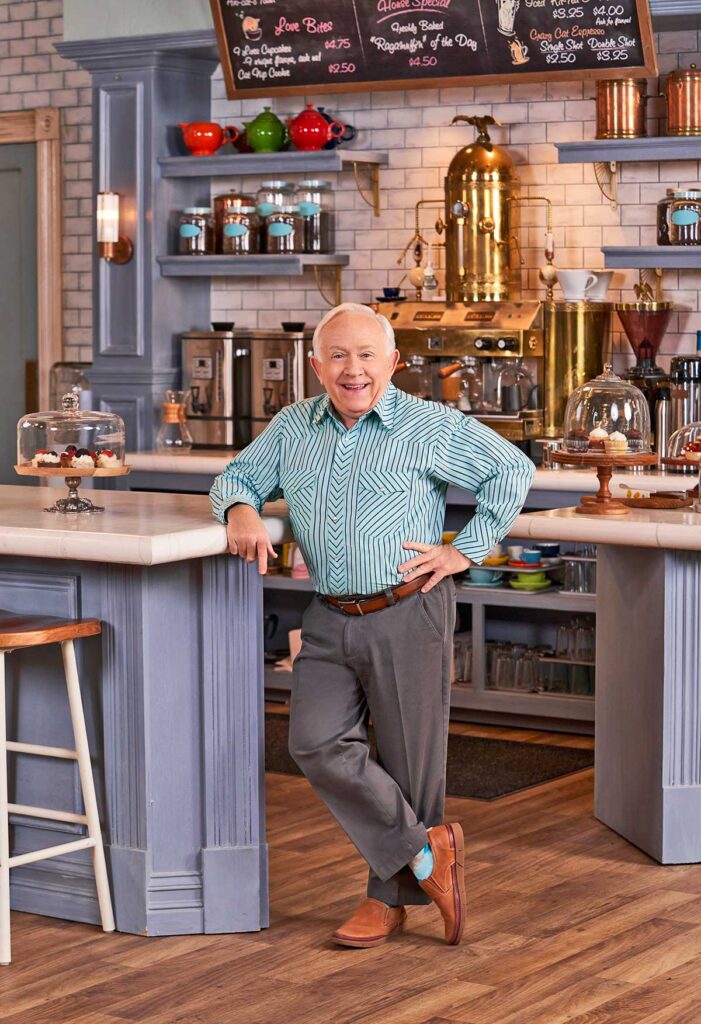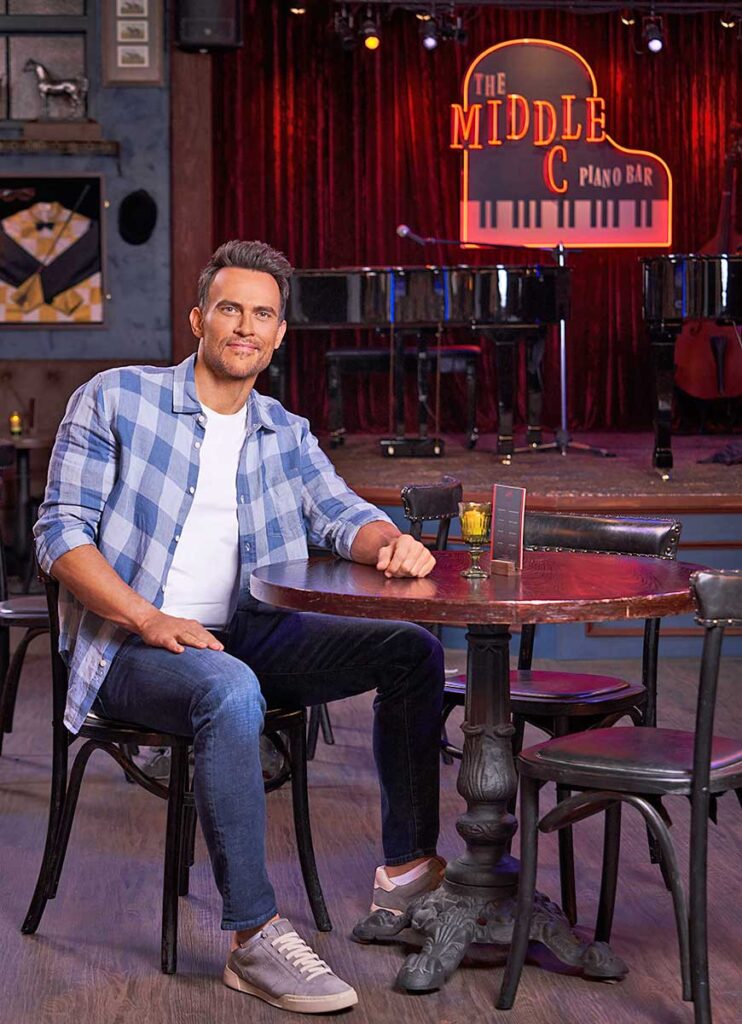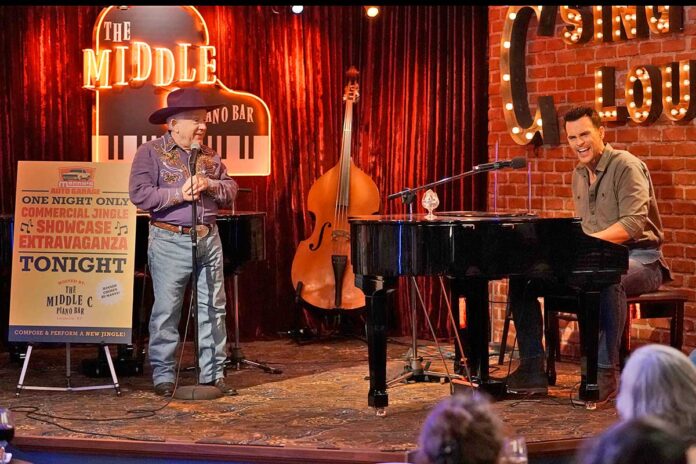Leslie Jordan and Cheyenne Jackson, co-stars in the Fox multicam sitcom “Call Me Kat,” are in separate locations on Zoom, tenderly admiring each other. As an openly gay actor, Jackson (“30 Rock” and “All Shook Up,” his first lead role on Broadway) affectionately acknowledges that Jordan, who’s also openly gay, has been a mentor to him ever since he saw him as Beverley Leslie on “Will & Grace.” Jordan, who admits he doesn’t know how to respond to younger generations who praise him for paving the way for them, recognizes Jackson for being precisely the kind of actor Jordan is not.
Since January 2021, the “Call Me Kat” actors have come together weekly to make viewers laugh through a seriously unfunny and fraught time. The sitcom, which also features Mayim Bialik as Kat and Swoosie Kurtz as Kat’s mom, Sheila, is now in its second season after premiering during the pandemic. As Phil, Jordan plays the gay head baker at Kat’s cat café, while Jackson portrays bartender Max, Kat’s former college boyfriend.
Recently, Jackson, 46, and Jordan, 66, got on Zoom to chat about shooting a sitcom during Covid, the potential for Jordan to get his first onscreen kiss, and why, during one episode, he moves so effortlessly in heels.

How much joy and levity has doing this show brought you during one of the most challenging times we’ll ever experience?
Cheyenne Jackson: It’s brought a significant amount of joy and stability and escapism. I think that’s really what we are all craving right now, because the world feels off of its hinges. To be able to go to work every day with five other people whom you adore and love and are inspired by, but also just to get to do something that is just unabashedly joyful and happy… I mean, what other show at the end of it has a curtain call? An old-timey curtain call!
It’s really just been such a gift. I know people overuse that phrase, but it truly has [been], being able to be home with my kids, go to work and then be home every day in time for dinner. I’ve only missed, maybe, two bedtimes this whole run. And when we have a week off, I definitely start to miss everybody and can’t wait to get back.
What about you, Leslie? What has the show meant to you, especially as a source of connection during a time when it’s been so hard to connect with people?
Leslie Jordan: We had an amazing beginning because we were going to shoot the pilot and then the pandemic hit. We got to meet each other over Zoom. I don’t think any of us really knew each other. I had worked with Cheyenne a couple times, but none of us were friendly-friendly. And all of a sudden during the pandemic, with the Zooms and getting things ready, they said, “The minute this is over, we’re going back.” When people didn’t even know if they were going to get jobs back, we knew what was ahead, we knew what was coming, and we just kind of bonded. And so by the time we got all of us together, we were just giddy. We just loved each other so much.
And it’s been hard because this show should be in front of an audience. It’s multicam, and it should be shot in front of an audience. And we’re aiming toward that, eventually. But we haven’t been able to have an audience. So we are doing comedy with very little laughter. We’ve had a director lately that screams at everybody and says, “Laugh!” Like those old camera men, they’ve heard it 20 times! You’re not going to get a giggle out of any of them. So we just have to know that what we’re saying is funny and that’s that. It’s been trying, but we have so much ahead of us, and I think this is a show that has some legs.
I read this article that what Fox was looking for with their pilot season was different kinds of shows [they] can pair with “Call Me Kat.” So it seems to me like they’re going to build nights around us. And I just want it to go for a while. I’m at an age. I’m 66. I was thinking if it went as long as “Big Bang Theory,” I’d be like almost 80 [laughs] when it’s over. I’ll be ready to retire. I’d be so rich.

I have appreciation for the show’s queer inclusivity, and I’m getting a real kick out of seeing Cheyenne playing one of the straightest men I’ve ever seen.
Jordan: He’ll walk over to me, and then he’ll go, “Listen, girl,” after he’s just been the butchest. [Laughs.]
What’s it like being a part of a show that touches on some really important LGBTQ-specific topics?
Jordan: You know, I feel so protected, I don’t know what it is. I just feel like I’m [in] this cocoon because, you know, writers come, they go, this one in and out. But right now we’ve got some writers that came from “Will & Grace” and wrote my Emmy episode [Jordan won in 2006 for Outstanding Guest Actor in a Comedy Series]. So everything they write, I adore.
Listen, I’ve done some stinkers over the years. But every week the scripts just get better and better and better. And we’re like, “Wow, they’re touching on all kinds of topics.” They were whispering the other day that they want to give me an onscreen kiss. I said, “Oh lord.” [Laughs.] That’ll be a first!
Who do you want to play that role, Leslie, is the question?
Jordan: Well, we approached Rob Gronkowski, that football player. I’m making that up. We did not approach him. [Laughs.] I think he would be good, though; they should ask him. I’ve got such a crush on him. I don’t even watch football, but I’m glued to that TV.
I have an appreciation for one of the episodes this season that touches on LGBTQ+ aging. Leslie, how did that bit about the unique experience of aging for LGBTQ+ people make it onto the show? Was that your doing?
Jordan: People think that as actors we have a lot of say, and maybe other actors do, but I don’t particularly… I’m the kind of actor that I think writers love because I show up and just say their words [laughs]. And I learned a long time ago that stage is an actor’s medium. Film is a director’s medium. TV is really a writer’s medium. That’s where you have wonderful, wonderful writers. And I know the process, that they sit around that table… “Will & Grace,” at one point, had 25 writers. Can you imagine? Twenty-five people sitting around the table, going over [a script] line by line by line. And then you show up, and the actors take off and then speak the words. I’m very reverent. You do your job. I’ll show up and bring it to life. Just give me the words. So no, I had nothing to do with that at all. They came up with it. I just loved it.
Jackson: First of all, I’ve never heard it put that way, the medium; that’s really, really cool. I love to think of it that way, and I am of like mind with Leslie that my job is to be a conduit. I go in there, and I take what they give me and portray it. But so much of what they’re writing now, especially our new additions that Leslie was talking about, I do believe they’re taking from our own lives and who we are in the world. So when they give Leslie a monologue like he did in the car about [aging] as Max, I feel like crying as Cheyenne because Leslie’s so brilliant, and Swoosie is so brilliant. The two of them together, I just love their dynamic. Sometimes a paragraph or a scene or just a set of lines will just hit you in the guts, and that was definitely one where I thought it was a home run. And, yeah, I have to definitely remember, “OK, I’m Max right now.” [Laughs.]
Cheyenne, how do you get through a take without laughing when Leslie is in a scene with you, particularly that episode where he learns to ride a bike?
Jackson: [Laughs.] Oh my god, oh my god. OK, so usually we have a lot of material to do, and I’m from the theater, and I love to prepare, and I love to be super solid on my lines. So when I get down there, if there’s going to be a bike or Leslie doing his thing, I don’t break. But with that particular episode — Anthony Rich directed, and it was really fast, and we have tons of rapid fire, and Leslie with the pratfall — it’s hard. To keep us on track is tough.
Did you two first meet on the set of “American Horror Story”?
Jackson: We were trying to figure this out the other day. I think it must have been.
Jordan: I think it was the day that we were shooting in a big theater and they had Trixie Mattel. She was on “American Horror Story” very briefly. You had the actor, and then you had the actor playing the actor, and then it went all… I couldn’t keep up with it. But that I think is where we met.
Jackson: But I’ve known who Leslie was forever and was a huge fan of “Will & Grace,” and I can quote all of his stuff, and I constantly do to him. It’s one of the joys of this.
Jordan: I just wish he’d butch it up a little bit sometimes when he’s doing it. [Laughs.]
Jackson: One of the biggest joys of this has been to get to know Leslie on a true friend basis, because the queer experience in Hollywood is, you have to have lived it to understand it. And I’m in my mid 40s now, and you know, I’ve been around a while. So I love to have mentors, and I love to have queer mentors. And Leslie has stories and advice and just so much wisdom. And sometimes, if I’m stuck on a line, I will go to him and say, “How do I make this funny rhythmically?” and he’ll say like, “Hit that, hit that, and then just drop that.” It’s just so intrinsic in him, whereas multicam is still new to me. So it’s one of my favorite things, being on a show with you.
I’m sure Cheyenne is not the only person to have told you that you’re a queer mentor to them. What is it like to hear that from other people in the LGBTQ+ community?
Jordan: I mean, I don’t get up in the morning and think, “The mentor has gotten up.” [Laughs.] You know, when I got to Hollywood in 1992, West Hollywood was where I dropped anchor. Queers were everywhere, and I thought, “Wow.” And then the crisis hit — the AIDS epidemic, which I’ve seen so many parallels between this pandemic and the last one.
I’ve been through it. I’ve been through a pandemic. I was on the forefront of Project Angel Food when it got started. I was right there in the meetings when Project Nightlight got started. I was around, and I did my share, and I’m very proud of that. And sometimes I look back and think, “Own it.” It’s so hard for us. My boyfriend constantly says to me, “When someone compliments you, Leslie, you compliment them back.” I’m working on that. I’m working so hard on that. Anyways, whatever. Where were we? What was the question?
You were just about to thank Cheyenne for what he said.
[Both laugh.] Jackson: Nice, Chris.
Jordan: And then sing his praises, which Cheyenne… he’s trained as an actor. I marvel. I go over there, and he’s got a script marked with stuff and I think maybe I should do that. But we all have our process. We all have a way in which we approach it. And his is to be admired, that’s for sure.
Jackson: Thank you, Leslie. We’re all learning from each other.
Jordan: You know what I am? I met this girl, and I said “When did you decide to become an actress?” She said, “Oh honey, I’m not an actress, I’m a depictress.” I said, “You’re a depictress, what does that mean?” She said, “I don’t do that whole method-y thing. I just depict; then I go home.” And well, OK, so maybe I’m a depictress. [Laughs.]
Leslie, you can really work some heels. I know you’ve joked before that you came out of your mom’s womb and immediately stepped into her heels, so is that why you are such a pro at dancing around in them on “Call Me Kat”?
Jordan: [Laughs.] No, it’s because I did drag when I was about 19. We would have drag parties and I was in my hometown; you couldn’t get in the bars at 17. So we’d have these drag parties up at this doctor’s house — this very wealthy doctor — and we would put together drag shows, and I was Miss Baby Wipes, that was my name. The sweet and petite Miss Baby Wipes. And I could work that stage. I’d do Tina Turner numbers and stuff, when they were all doing Barbra Streisand.
Jackson: I knew that you’d be good in heels, but when we had that episode with heels the other day and you popped them on, he was like “bum, bum, bum, bum, bum!” It was amazing. I can’t do that.
This cast is obviously very musical. And given that there’s an actual stage right there on set, how much unprompted singing goes on behind the scenes?
Jackson: Mayim and I often find ourselves behind the pianos just playing, and Mayim is incredibly musical and plays a bunch of instruments, and I love that they write that into the show a lot. But I’d like to see Leslie have a musical moment.
Jordan: I will hear Cheyenne and Mayim just sit down at the piano and sing and think, “Oh, that’s wonderful.” I was on Reba McEntire’s show many, many years ago and she’d do that. All of a sudden she’d start singing and it was like, “My god, that’s Reba over there just singing.”
Jackson: I want Leslie to do a number after his makeout scene.
Jordan: With the Gronk!
Chris Azzopardi is the Editorial Director of Pride Source Media Group and Q Syndicate, the national LGBTQ+ wire service. He has interviewed a multitude of superstars, including Cher, Meryl Streep, Mariah Carey and Beyoncé. His work has also appeared in The New York Times, Vanity Fair, GQ and Billboard. Reach him via Twitter @chrisazzopardi.

